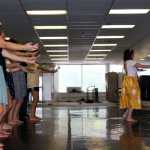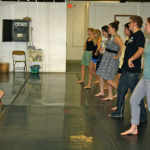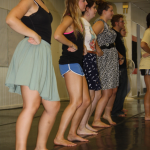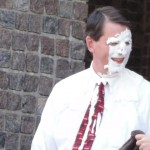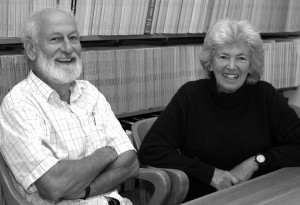Standard health and safety inspections from the Delaware General Health District found routine violations in the five OWU off-campus food point locations.
Stephanie DeGenaro, program manager for the food protection and public safety unit of the DGHD, said the violations found in inspections are split evenly between critical and less serious violations.
She said critical violations have a “direct relationship to the transmission of foodborne illnesses,” including improper food handling, lack of proper hand-washing and other common offenses.
These violations are corrected with an inspector present or receive a follow-up visit three to five days later.
“Less serious violations such as a missing floor tile, burnt out light bulb or general cleaning will be given about two weeks, then (we) go back to see,” DeGenaro said.
She said a restaurant license period runs from March 1 until the end of February of the following year, with a minimum of two standard inspections in this period.
“If a restaurant is open and operating, we haven’t revoked their license or aren’t taking action against them,” DeGenaro said. “There may be circumstances where a license is in the process of being reviewed, but during this process the facilities are allowed to remain open.”
She also said written and oral complaints against businesses are logged and investigated within three business days.
“Sometimes it’s a phone call, followed by a site visit, but we do respond,” she said.
The results of standard investigations, as well as formal customer complaints, are documented in the public record at the DGHD office.
Violations are under the categories of Management and Personnel; Food; Equipment, Utensils and Linens; Water, Plumbing and Waste; Physical Facilities; Poisonous or Toxic Materials; Special Requirements; and Administrative.
Ohio Wesleyan University has partnerships with Amato’s Wood Fired Pizza To Go, Hamburger Inn, Mean Bean Caffeine Lounge, Subway Sandwiches & Salads and Vaquero’s to offer off-campus dining services to students through the food point program. The three most recent health and safety inspections were reviewed for each location.
Amato’s Woodfired Pizza To Go
Craig Johnson, partner at Amato’s restaurant, said once Amato’s got onto the off-campus food point program, they were not removed.
“The more you can get students eating food here the better,” he said. “It helps give them more dining opportunities.”
He said earlier in the semester, when students have more food points, they tend to frequent the off-campus locations more. Johnson said about 20 percent of Amato’s business comes from students–with and without their food points.
He also said Amato’s, similar to other establishments in town, is regularly inspected by the health department.
“We follow all the protocol with thermometers, washing hands and other regulations,” he said. “The county has a process in place for inspecting.”
A standard health and safety inspection on Aug. 22, 2011, found five violations at Amato’s.
The violations included equipment held together with duct tape, prepared salad dressing held at 44 degrees Fahrenheit instead of the required 41 degrees or below, and lights in the kitchen were not properly shielded, according to the inspection record.
An additional 13 violations were found in the inspection on Jan. 3.
Old food debris was on the interior cabinets; a prep employee was unable to demonstrate “knowledge in food safety properly;” and meatballs were reheated in a steam well at 96 degrees instead of the required 165 degrees Fahrenheit, according to the inspector’s record.
Amato’s had three violations in the most recent inspection on Jan. 24.
The inspection record said an indirect plumbing line was used for waste and water, the floor under the dishwasher wasn’t smooth and the kitchen walls were found in “disrepair,” according to the inspection sheet.
“You have to stay on top of code and correct violations,” Johnson said. “They’ll come back the next week and check if you don’t.”
Hamburger Inn
Bill Michailidis, owner of Hamburger Inn, said his restaurant provides a valuable service to the community and students.
“Being open as many hours as we are, it provides an alternative source for students to get away from the college life and their stressful schedules,” he said.
Michailidis said, through the off-campus food point program, Hamburger Inn is offering alternative food possibilities to students.
“We’re complimenting, not replacing the food that is available,” he said.
Michailidis said all employees go through a certification process to ensure proper health and safety codes are met.
In addition, he said general managers, shift managers and he as an owner inspect logs to implement these standards.
“We want to be current with all of the health code standards,” he said. “We enforce them and inspect constantly.”
On Aug. 15, 2011, the standard health and safety inspection yielded three different violations at Hamburger Inn.
According to this inspection sheet, raw meat was stored above ready-to-eat foods in a cooler; the restaurant floor, “especially in the hard-to-reach areas,” was not clean; and surfaces near the fryer and grill were not clean.
On Nov. 4, 2011, there was an inspection which resulted from an anonymous complaint. The complaint included bare hands touching baked goods, roaches at the bottom of the ice machine and roaches underneath the lottery machine.
The post-complaint inspection sheet noted employees wearing gloves and the restaurant showed no signs of roaches. According to the inspection sheet, the hole in the wall behind the lottery machine had been patched to prevent further insects from gaining access to the restaurant.
The most recent standard health and safety inspection on January 20, found eight violations. Raw eggs were found stored above ready-to-eat foods in the cooler; boxes of napkins were being stored on the floor instead of six inches off the ground; and mixers, the grill shelf and sections of the floor were found to be dirty, according to the inspection record.
Michailidis said seasonal pests such as roaches sometimes enter establishments in the summer or fall, seeking shelter as the temperature changes.
“To prevent any problems we try to stay ahead of the game,” he said. “When you have older buildings you have to stay on top of this and make sure there is constant oversight.”
Michailidis said the November infestation was an isolated incident and there are currently no problems at Hamburger Inn.
“We look for the source that causes the problem,” he said. “There was a crack in the wall that was repaired. Almost 90 percent of the time these pests come from warehouses, so we also always have to be vigilant in checking vegetables.”
He said overall, the restaurant is well-liked by the campus and community.
“We have a good amount of students and faculty who join us for breakfast, lunch and dinner,” Michailidis said.
Mean Bean Caffeine Lounge
The Mean Bean underwent a change of ownership and a new restaurant license was issued during this process. Only the most recent inspection on Dec. 14, 2011 took place under the new ownership.
The standard inspection on July 8, 2011, found four violations at Mean Bean.
Among other notes, the health department found the following violations. A non-commercial microwave was being utilized, but according to health department standards, all equipment “shall be commercial grade;” a light shield was missing above a sink, but “lights shall be shielded in areas where food/equipment/utensils are exposed;” and a wall below the cash register was in “disrepair,” according to the inspection record.
The inspection on Sept. 23, 2011, was a consultation inspection and found several problem areas in the establishment. The recommendations included repainting storage area walls, resealing the edges of the sinks and moving the dryer and washer out of the “prep/bakery area,” according to the consultation record.
The most recent inspection on Dec. 14, 2011, found six violations at Mean Bean.
“Spillage” on the floor beneath the basement coolers, rust on the interior of the Arctic Air refrigeration unit, and a missing light shield in the front display cooler which had “exposed foods” in it, were among the violations noted on the inspection record.
Attempts to contact the owner were unsuccessful.
Subway Sandwiches & Salads
Located on S. Sandusky Street, Subway is two doors down from Amato’s, one of the other businesses which accepts off-campus food points.
The standard health and safety inspection on June 28, 2011, found eight health and safety issues.
The inside of the ice chute had mildew growing in it and according to the health department, equipment which contacts food should be “clean to sight and touch.” A mop was stored in a bucket with old mop water; this is a problem because mops are supposed to be “hung dry after use so that they can air dry,” according to the inspection record.
Additionally, one section of the floor had “old food residue and syrup spillage.” The health department mandates floors should be maintained in a clean fashion.
A follow-up inspection took place on July 5, 2011, to check the above violations. This inspection found the previous violations had been corrected and noted only one remaining violation.
Under the category of maintenance and operation of physical facilities, a corner joint was in disrepair and had been temporarily fixed with duct tape. According to the report, “physical facilities shall be in good repair,” so the broken wall was a violation of health and safety codes.
The most recent inspection on Dec. 14, 2011, found seven violations. Pickles and pickle residue found in the hand sink were in violation of the health department mandate that this type of sink should “be used for no purpose other than hand washing.”
Trays were found stored on the floor. The health department record said equipment should be stored at least six inches off the floor; this violation was corrected during the inspection. The health department also found dirty lids above the bread table during the inspection; this was a violation because according to the inspection record, “equipment should be clean to sight and touch.”
Attempts to contact the manager of Subway were unsuccessful.
Vaquero’s Restaurant
Servando Radilla, manager of Vaquero’s, said it’s important for the restaurant to be on the off-campus food point program because they provide a good service to students.
“We’re trying to maintain good a relationship with the students and the school through the program,” he said.
Radilla said the restaurant makes between $400-500 per day from OWU business.
“The daily amount of students depends on a lot of things,” he said. “Some people spend less or eat less, while others spend a lot more.”
Radilla said the most common health code problem Vaquero’s runs into is hair in the food.
“We don’t have many problems, but this is one,” he said. “It’s not because of my employees because they all wear hair nets. Sometimes customer hair or other hair just gets into the food accidentally.”
A standard health and safety inspection on Sept. 15, 2011, found 17 violations at Vaquero’s; three of these are listed below.
A leak on the iced tea line was spotted because “plumbing shall be maintained in a state of good repair;” an unlabeled chemical bottle was found and according to the health department, “chemicals shall be labeled with the common name to prevent contamination;” and wet dishes were stacked together instead of separated to allow for drying before being re-shelved.
A follow-up inspection on Oct. 5, 2011, found the previous violations had been addressed. One new violation was documented under the category of maintenance and operation. A second standard inspection on Feb. 6, documented 12 violations.
During this inspection, employees failed to wash hands before beginning food prep activities, but did so upon the request of the inspector. Raw chicken was found stored above a container of raw beef in the upright cooler and according to the inspection sheet, raw chicken should be stored below raw beef to prevent contamination. This was corrected during the inspection.
Also during this inspection, a section of wall was found missing in the archway to the kitchen; this was a problem because “physical facilities shall be maintained in a state of good repair,” according to the inspection report.
A follow-up inspection on Feb. 7, inspected the corrected violations from the previous day’s visit. Only three violations were noted at this time.
The most recent health and safety inspection on March 28, noted three violations at Vaquero’s. According to the inspection record, a wall cove was missing near the kitchen, a torn gasket was found on a 2-door upright cooler and several knives were incorrectly stored.
Radilla said any violations the health department documents are corrected right away. He said if a violation is minor, it will typically be corrected while the inspector is present.
“We’ve got a good reputation for our food,” he said. “Everything we use is new; nothing is left over.”
What about Chartwells?
Ohio Wesleyan University has 11 locations where students and faculty members may purchase food through the Chartwells company.
OWU’s Bishop Café was among 114 locations recently awarded a Clean Establishment Award for the 2011-2012 licensing year, according to a DGHD news release.
These were awarded for “excellent food safety and cleanliness practices” and “no critical food safety violations were noted” in the two most recent inspections of these locations, according to the news release.
Gene Castelli, resident district manager of Chartwells, said all of the on-campus locations have been awarded this designation at one time or another.
He said the most common violation results when a lazy employee doesn’t wear gloves.
“We stress this, along with proper hand washing, as the best way to be safe when handling food,” he said.
Castelli said “on the rare occasion” a violation occurs in a campus location, the problem is fixed right away. He said procedures are in place for purchasing products, receiving, handling, preparing and cooking the food in conjunction with health department standards.
“During our associate meetings we always present a small section on food or general safety,” he said.
Castelli also said all managers and supervisors recently completed ServSafe, an online food safety certification, and some hourly employees have also chosen to take the course.
“Our motto is not ‘Safety First,’ but rather it is ‘Safety Always,’” he said.
The off-campus food point locations are selected annually through WCSA and a student poll. Chartwells has no connection to this program.
